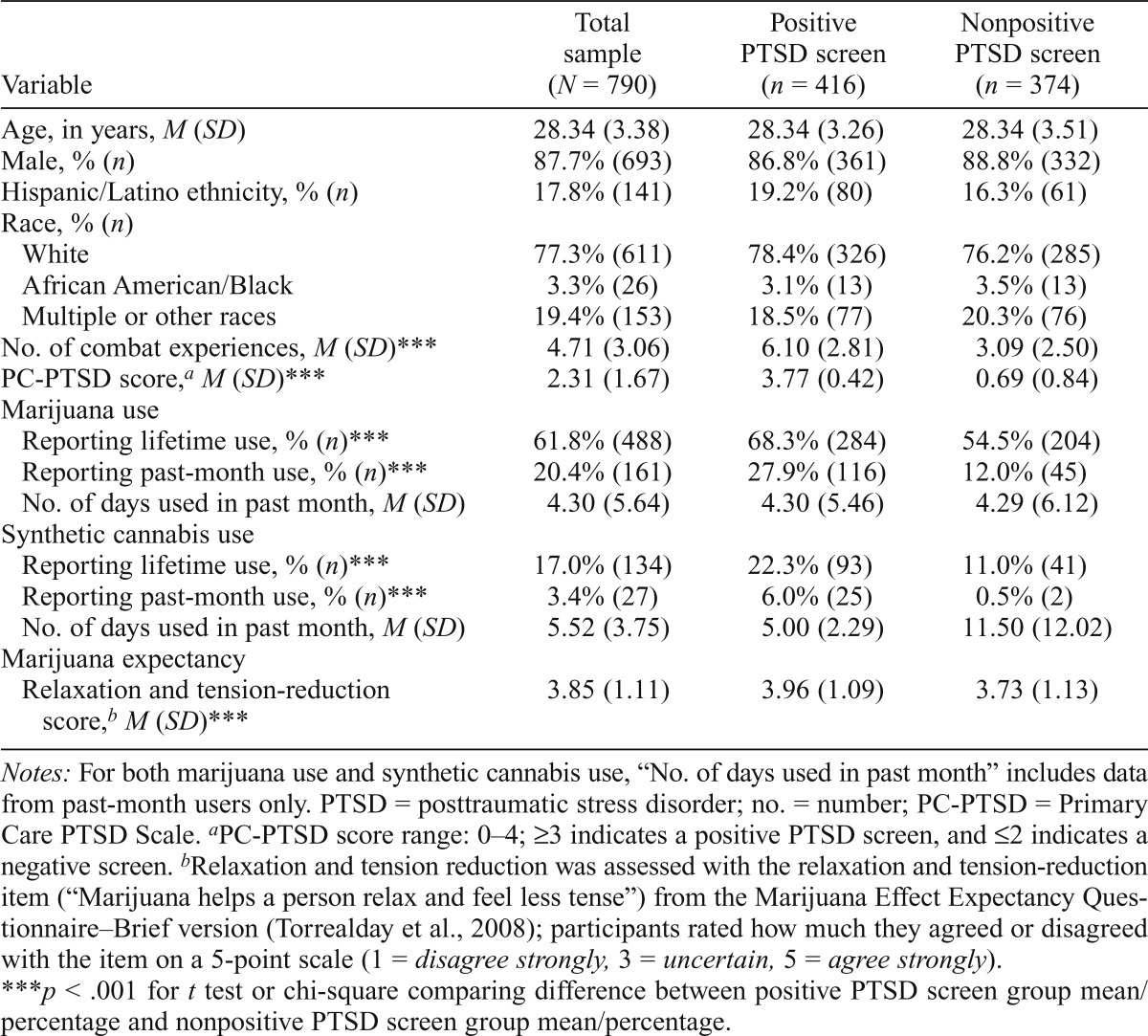Table 1.
Participant demographics, PTSD symptoms, substance use, and marijuana expectancies
| Variable | Total sample (N = 790) | Positive PTSD screen (n = 416) | Nonpositive PTSD screen (n = 374) |
| Age, in years, M (SD) | 28.34 (3.38) | 28.34 (3.26) | 28.34 (3.51) |
| Male, % (n) | 87.7% (693) | 86.8% (361) | 88.8% (332) |
| Hispanic/Latino ethnicity, % (n) | 17.8% (141) | 19.2% (80) | 16.3% (61) |
| Race, % (n) | |||
| White | 77.3% (611) | 78.4% (326) | 76.2% (285) |
| African American/Black | 3.3% (26) | 3.1% (13) | 3.5% (13) |
| Multiple or other races | 19.4% (153) | 18.5% (77) | 20.3% (76) |
| No. of combat experiences, M (SD)*** | 4.71 (3.06) | 6.10 (2.81) | 3.09 (2.50) |
| PC-PTSD score,a M (SD)*** | 2.31 (1.67) | 3.77 (0.42) | 0.69 (0.84) |
| Marijuana use | |||
| Reporting lifetime use, % (n)*** | 61.8% (488) | 68.3% (284) | 54.5% (204) |
| Reporting past-month use, % (n)*** | 20.4% (161) | 27.9% (116) | 12.0% (45) |
| No. of days used in past month, M (SD) | 4.30 (5.64) | 4.30 (5.46) | 4.29 (6.12) |
| Synthetic cannabis use | |||
| Reporting lifetime use, % (n)*** | 17.0% (134) | 22.3% (93) | 11.0% (41) |
| Reporting past-month use, % (n)*** | 3.4% (27) | 6.0% (25) | 0.5% (2) |
| No. of days used in past month, M (SD) | 5.52 (3.75) | 5.00 (2.29) | 11.50 (12.02) |
| Marijuana expectancy | |||
| Relaxation and tension-reduction score,b M (SD)*** | 3.85 (1.11) | 3.96 (1.09) | 3.73 (1.13) |
Notes: For both marijuana use and synthetic cannabis use, “No. of days used in past month” includes data from past-month users only. PTSD = posttraumatic stress disorder; no. = number; PC-PTSD = Primary Care PTSD Scale.
PC-PTSD score range: 0-4; ≥3 indicates a positive PTSD screen, and ≤2 indicates a negative screen.
Relaxation and tension reduction was assessed with the relaxation and tension-reduction item (“Marijuana helps a person relax and feel less tense”) from the Marijuana Effect Expectancy Questionnaire–Brief version (Torrealday et al., 2008); participants rated how much they agreed or disagreed with the item on a 5-point scale (1 = disagree strongly, 3 = uncertain, 5 = agree strongly).
p < .001 for t test or chi-square comparing difference between positive PTSD screen group mean/percentage and nonpositive PTSD screen group mean/percentage.

